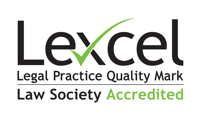
Buying Freehold
Put your trust in Clifford Johnston & Co.
- Residential Conveyancing Experts
- Law Society Conveyancing Quality Accredited
- Fixed Fee Conveyancing Available
- Contact us for a Free, No Obligation Quote
Freehold Purchase Solicitors in Stockport & Manchester
Our solicitors provide expert legal advice to help you gain full ownership of your property. If you currently own a leasehold house or flat, acquiring the freehold can give you greater control over your home, reduce long-term costs, and eliminate the uncertainty of landlord involvement.
Clifford Johnston & Co has over 30 years of experience in helping clients acquire their Freehold and have helped countless clients across Stockport, Manchester and the wider North West successfully transitioning from leasehold to freehold ownership. We handle the entire process with care and precision, from initial legal checks to negotiating with freeholders and completing your registration with HM Land Registry.
Purchasing the freehold of your property can feel daunting, especially when dealing with complex legislation and uncooperative landlords. We simplify the process by handling all aspects on your behalf, from the initial stages of negotiations to the final registration with HM Land Registry.
We regularly act for clients under the Leasehold Reform Act 1967 and the Leasehold Reform, Housing and Urban Development Act 1993, ensuring all legal requirements are met and your rights are fully protected.
As accredited conveyancing solicitors under the Law Society’s Conveyancing Quality Scheme (CQS), we deliver a service that is recognised for its quality and client care. You will receive regular updates, honest advice, and the reassurance that your matter is in expert hands.
Get in touch with a member of our conveyancing team today to discuss your options and take the next step towards owning your property outright.
How Our Solicitors Can Help
Buying the freehold of your property is a smart move that can give you long-term financial benefits and peace of mind. But it’s a legal process that requires expert guidance and firm negotiation. That’s where our specialist freehold purchase solicitors come in.
At Clifford Johnston & Co, we provide trusted freehold conveyancing services tailored to your circumstances. With over 30 years of experience in property law, we ensure your freehold acquisition is handled quickly, efficiently and with full legal protection. Our team will keep you informed at every stage, giving you confidence and clarity from the outset.
Here’s how our freehold purchase solicitors can support you:
- Confirm your legal right to buy the freehold
- Serve the Initial Notice to the freeholder
- Negotiate the premium and terms of sale
- Draft and review all legal documents
- Handle communications with the freeholder’s solicitors
- Register the freehold with HM Land Registry
When you choose Clifford Johnston & Co, you’ll receive personal service from a solicitor who understands your goals and works hard to achieve them. Contact us today to speak to a member of our conveyancing team and take the first step towards full ownership of your property.
Is Buying Freehold the Same as Lease Enfranchisement?
These terms are closely related but describe different aspects of the same legal process. Understanding the distinction is important when deciding which route applies to your situation.
Buying the Freehold
This refers to the outcome of becoming the full legal owner of your property and the land it stands on. Once the freehold is purchased, the lease can come to an end, and the property may no longer be subject to ground rent, service charges, or restrictions imposed by a Landlord.
Lease Enfranchisement
Lease enfranchisement is the legal process that allows leaseholders to buy their freehold of their building, particularly in the case of flats. It is the statutory route established by legislation, and it varies depending on the type of property.
If you own a leasehold house, and you meet certain criteria (such as owning the lease for at least two years and holding a long lease), you can usually purchase the freehold individually under the Leasehold Reform Act 1967.
If you own a flat, you will normally need to join with other leaseholders in your building to purchase the freehold together. This is known as collective enfranchisement, governed by the Leasehold Reform, Housing and Urban Development Act 1993.
Reasons to Buy Freehold Property
Buying the freehold of your home provides long-term security, financial benefits and peace of mind. Many leaseholders choose to purchase the freehold in order to take control of their property, remove legal and financial uncertainties, and enhance the overall value of their home.
Eliminating Ground Rent
One of the most immediate benefits of buying the freehold is the end of ground rent payments. With no landlord to pay, you can save a significant amount over time, especially with the recent rise in variable ground rent clauses.
Full Control Over Your Property
As a freeholder, you are no longer bound by lease restrictions. You can make changes, carry out improvements, and manage your home without seeking permission or facing limitations imposed by a third party.
Avoiding Service Charge Disputes
Freehold ownership removes the risk of unexpected service charges or inflated maintenance costs. You decide how your property is managed and can avoid disagreements with managing agents or landlords.
More Attractive to Future Buyers
Freehold properties are typically easier to sell and remortgage. Buyers and lenders are often cautious of short leases, and owning the freehold eliminates this concern entirely.
No Lease Expiry Concerns
Leases are time-limited assets. When you own the freehold, there is no need to worry about costly lease extensions or the diminishing value of a short lease.
Potential for Added Value
Purchasing the freehold can increase the value of your home, particularly if the lease is nearing expiry or contains terms that deter buyers or lenders.
The Legal Process of Buying Freehold
Buying the freehold of a leasehold house is a detailed legal process that’s governed by the Leasehold Reform Act 1967. The procedure involves specific steps which must be followed carefully to secure your rights and avoid unnecessary delays. We will guide you through every stage, ensuring the process is handled with accuracy and confidence.
Step 1: Confirming Eligibility
Before taking action, we will assess your eligibility to purchase the freehold. To proceed under the statutory scheme, the following must be met:
- The property must qualify as a ‘house’ under the Leasehold Reform Act 1967. This has a specific legal definition and may include properties that are not traditional houses, such as certain converted buildings, provided they are structurally self-contained.
- The lease must have been originally granted for more than 21 years
- You must have owned the lease for at least 2 Years at the date of the claim
We will review your lease in detail and confirm whether you meet these legal requirements before moving forward.
In some cases, it may be possible to approach the freeholder informally to negotiate a voluntary purchase of the freehold. While this can sometimes be quicker and more flexible, it does not offer the same legal protections as the statutory route. We will advise you on the advantages and risks of each approach and whether an informal agreement is appropriate in your circumstances.
Step 2: Serving the Section 8 Notice of Claim
If a voluntary agreement is not possible or advisable, we will prepare and serve a formal Notice of Claim under Section 8 of the Leasehold Reform Act 1967. This notice must include prescribed information, such as a description of the property, key lease details, and the premium you propose to pay for the freehold.
Once served, the Section 8 Notice initiates a legally binding process and triggers strict statutory deadlines for the freeholder to respond. It also protects your legal position, even if the freeholder is uncooperative.
It’s important to remember that this statutory right applies only to qualifying leaseholders of houses, as defined under the legislation. We will advise you fully on this definition and confirm that your property is eligible before serving the notice.
Step 3: Landlords Response
Once the Section 8 Notice has been served, the freeholder has two months to issue a counter-notice. This notice must either admit or dispute your right to acquire the freehold.
The freeholder may also formally request:
- A statutory deposit (either £25 or three times the annual ground rent, whichever is greater)
- Copies of the property’s title documents
- A statutory declaration confirming your eligibility under the Act
If the freeholder fails to respond within the two-month period, or if they dispute your claim, we may need to apply to the County Court for a determination of your entitlement or, in certain cases, seek a vesting order to compel the sale.
We will manage all correspondence with the freeholder and ensure you meet every legal deadline during this stage.
Step 4: Valuation and Negotiation
The premium payable for the freehold is calculated based on a number of valuation factors, including:
- The length of the remaining lease term
- The amount of ground rent payable
- The current market value of the property
We will help you instruct a suitably qualified surveyor with experience in leasehold enfranchisement valuations. Once the valuation is complete, we will enter into negotiations with the freeholder to agree a fair and reasonable price.
If the parties are unable to reach agreement, either side may apply to the First-tier Tribunal (Property Chamber) in England or the Leasehold Valuation Tribunal in Wales, which will determine the premium and settle any outstanding points of dispute.
Step 5: Agreeing the Terms of Sale
In addition to agreeing the premium, the legal terms of the transfer (conveyance) must also be negotiated. These terms may include:
- Any restrictive covenants or easements that will apply to the freehold
- Provisions relating to rights of way, access, or shared facilities
- Any other clauses affecting your future use of the property
Each party may serve notice proposing specific terms, and the other side must respond within four weeks. If agreement cannot be reached, the matter may be referred to the Tribunal for resolution.
Our specialists Freehold Conveyancing Solicitors will handle all negotiations on your behalf and ensure that the final documentation protects your interests and is aligned with your future plans for the property.
Step 6: Completion of the Purchase
Once both the premium and the legal terms of the transfer have been agreed, the matter proceeds to completion. We will:
- Draft or review the transfer deed
- Ensure all parties sign the necessary documents
- Arrange for the payment of the premium and any legal or professional costs
In some cases, the parties may choose to exchange contracts before completion, particularly where timeframes or third-party consents are involved.
On the agreed completion date, ownership of the freehold will be legally transferred to you.
Step 7: Registration with HM Land Registry
Following completion, we will handle the registration of your freehold ownership with HM Land Registry. This updates the property’s title register to reflect the transfer from leasehold to freehold ownership.
Once registered, you will appear on the title as the freeholder and the leasehold title can either be closed or retained as part of the historical record, depending on how the transaction is structured.
You will now own the property outright and will no longer be subject to leasehold obligations such as ground rent, landlord consents, or service charges (unless your property forms part of a larger estate with shared obligations).
Costs and Considerations
In addition to the purchase premium itself, you will be responsible for several associated costs, including:
- Your own legal fees and surveyor’s fees
- The freeholder’s reasonable legal and valuation costs (as required under the Act)
- Any statutory deposit (if requested)
- HM Land Registry registration fees
- Any Stamp Duty Land Tax (SDLT), if applicable
We will provide a full breakdown of all estimated costs at the outset and keep you updated as the matter progresses, so you can budget with confidence and avoid any surprises.
Frequently Asked Questions for Buying Your Freehold
How do I know if I’m Eligible to Buy the Freehold?
You may be eligible if:
- The property is a house
- Your lease was originally granted for more than 21 years
- You have owned the lease for at least two years
Our solicitors can review your lease and confirm your eligibility under the Leasehold Reform Act 1967.
What is the Tenant’s Notice of Claim?
This is the formal notice served under Section 5 of the Leasehold Reform Act 1967 to begin the statutory process of buying the freehold. It sets out your intention to purchase and includes key details such as the property description and proposed premium.
How Long Does the Freehold Purchase Process Take?
The timescale can vary. A voluntary agreement may take a few months, while a statutory claim involving negotiations or a tribunal could take 6–12 months or longer. We’ll keep you updated every step of the way.
Can I Buy the Freehold if I Own a Flat?
Flat owners usually cannot buy the freehold on their own. Instead, leaseholders in the building must act together in a process called collective enfranchisement. You can learn more by speaking with our Leasehold Enfranchisement Solicitors.
Can I Buy the Freehold if my Lease has Less Than 80 Years Remaining?
Yes, you can still purchase the freehold. However, if your lease has less than 80 years remaining, you may be required to pay an additional amount known as “marriage value,” which reflects the increase in property value after acquiring the freehold. This can make the purchase more expensive.
What Happens if the Freeholder Refuses to Sell?
If the freeholder refuses a voluntary sale, you can initiate the statutory process under the Leasehold Reform Act 1967 by serving a Tenant’s Notice of Claim. This legal route compels the freeholder to sell, provided you meet the qualifying criteria.
Are There any Properties That Don't Qualify for Freehold Purchase?
Certain properties may be excluded from the right to buy the freehold, such as:
- Properties with significant commercial use
- Houses with shared ownership leases
- Properties owned by charitable housing trusts
It’s essential to review your lease and property details to determine eligibility
Will I Need to Pay the Freeholder's Legal and Valuation costs?
Yes, under the statutory process, you are typically responsible for the freeholder’s reasonable legal and valuation costs associated with the sale. These costs are in addition to your own legal and surveyor fees.
What is Included When I Buy the Freehold?
When purchasing the freehold, you acquire ownership of the property and the land it stands on. This may also include any associated structures or land, such as gardens or garages, that are part of the lease.
Contact Clifford Johnston & Co
If you are looking to take control of your property and buy the freehold of your leasehold home, our expert solicitors are here to help. With clear advice, tailored support and a focus on results, we make the process straightforward and stress free.
We have over 30 years of experience supporting homeowners across the North West with complex residential property matters. Our Residential Property Solicitors are trusted by clients in Stockport, Manchester and beyond to provide practical, honest advice at every stage.
We are proud of the positive difference we make and the long standing relationships we build with our clients. Contact us today for a free, no obligation consultation and speak to one of our specialist Freehold Conveyancers.
We’re here to help and we’ll always respond promptly.

Need some professional advice?
Do you have any issues that you are worried about? Contact our professional team for a free, no-obligation informal discussion, where we can discuss your particular requirements in greater detail.









